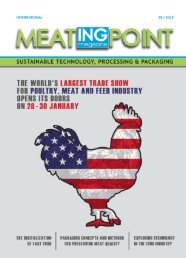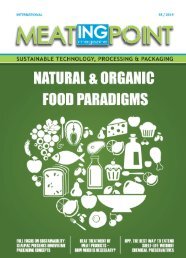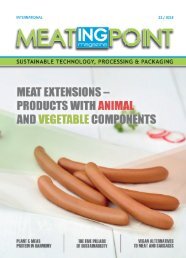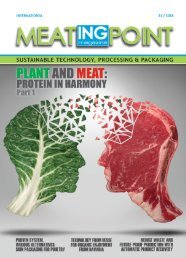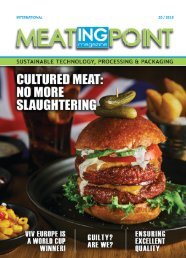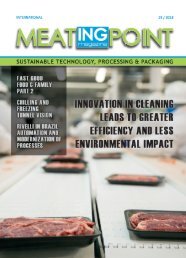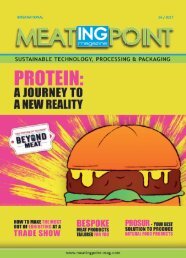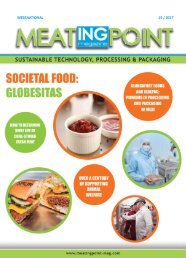MEATing POINT Magazine: #08/ 2016
Create successful ePaper yourself
Turn your PDF publications into a flip-book with our unique Google optimized e-Paper software.
TRENDS<br />
the reach of large corporations – including<br />
their financial motives – which will increase<br />
pressure to relax the stringent certification<br />
rules and standards. For example, there is a<br />
strong push to approve non-organic additives<br />
such as sodium bicarbonate (baking soda)<br />
to prepare organic bread and pastries.<br />
Compared to 2002 when 77 non-organic<br />
additives were allowed, the list has grown to<br />
some 250 nonorganic compounds in <strong>2016</strong>.<br />
In a very special way, organic has become<br />
a victim of its own success. It is estimated<br />
that in <strong>2016</strong> about 4 percent of all foods<br />
sold in the US will be organic.<br />
There is little doubt that -over time- the<br />
definition of organic food will gradually<br />
change. What about the use of genetically<br />
modified biotech enzyme additives like<br />
docosahexaenoic acid algae oil (DH) or single<br />
cell oil produced through nanotechnology?<br />
Increasingly, these and more similar additives<br />
will find their way into the organic foods that<br />
are treasured by numerous consumers who<br />
want to feel good about food and do not<br />
mind paying much higher prices.<br />
Ultimately, this question must be answered:<br />
How sustainable is organic agriculture?<br />
Environmental sustainability includes the<br />
promotion of ecological balance and<br />
biodiversity, as well as soil and water health.<br />
However, it excludes the use of synthetic<br />
fertilisers, pesticides, antibiotics and hormones.<br />
What about the labelling of food as<br />
“organic” if non-renewable fuels are used for<br />
agricultural growth, harvest, and transport<br />
to the point of consumption? What about<br />
“organic” milk if cows are not partly fed by<br />
grazing in an open pasture but by full-time<br />
housing in covered feedlots?<br />
The affluent consumers’ interest and attention<br />
for products that do not contain genetically<br />
engineered ingredients are growing rapidly<br />
and changing constantly. Sales of “organic”<br />
and “natural” foods are growing at a<br />
faster pace than sales in other categories.<br />
While the word “organic” can be narrowly<br />
defined, “natural” food leaves lots of room<br />
for different interpretations. For example,<br />
can food retain the status “natural” if it is<br />
processed and when artificial additives are<br />
used to increase shelf life, improve flavor,<br />
taste, and health attributes or when it<br />
contains biotech ingredients? The answer<br />
is not easy - a barrage of lawsuits will most<br />
probably fight this issue with special interest<br />
groups on different sides of the issue.<br />
Is Organic Environmental-friendly?<br />
Over-utilising certain resources like clean<br />
water will accelerate depletion, which could<br />
eventually become an issue for organic<br />
certification. Farmers, food producers,<br />
supermarkets, consumers, and special<br />
interest groups like environmentalists each<br />
have their agenda.<br />
Further growth of the organic category will<br />
expectedly increase tensions in choosing<br />
which definitions or specific pathways to<br />
follow. For example, it is very expensive to<br />
grow organic produce in the US during<br />
winter months. Greenhouses are typically<br />
energy guzzling, not to mention labor cost<br />
intensive. A tomato picker in Florida may<br />
earn $80 a day compared to $10 a day<br />
in Mexico. These differences, such as the<br />
rapid depletion of groundwater at the<br />
expense of the environment when cultivating<br />
organic produce in certain low-cost areas<br />
like Mexico and Honduras, are not usually<br />
communicated to the end-user.<br />
Related to organic foods is the issue of<br />
greenhouse gas emissions. When discussing<br />
the virtues of plant-based diets, environmental<br />
activists often cite better health and less<br />
greenhouse gas emission as the main<br />
advantages. Is this true? Although plantbased<br />
diets are considered healthy, the issue<br />
of net-greenhouse gas emissions associated<br />
with food production is debatable in the<br />
very least. It is true that the productions of<br />
animal foods like meat, poultry, dairy, (land)<br />
farmed fish, and eggs are associated with<br />
higher levels of greenhouse gas emissions<br />
compared to vegetables and fruits. But it<br />
is also true that livestock can be kept on<br />
land not suitable for crop cultivation. These<br />
differences need to be taken into consideration<br />
when discussing environmental issues as well.<br />
Digging a little deeper, plant-based diets<br />
are typically low-energy and are defined<br />
as high in vegetables and fruits. However,<br />
issue 8 | www.meatingpoint-mag.com<br />
37




